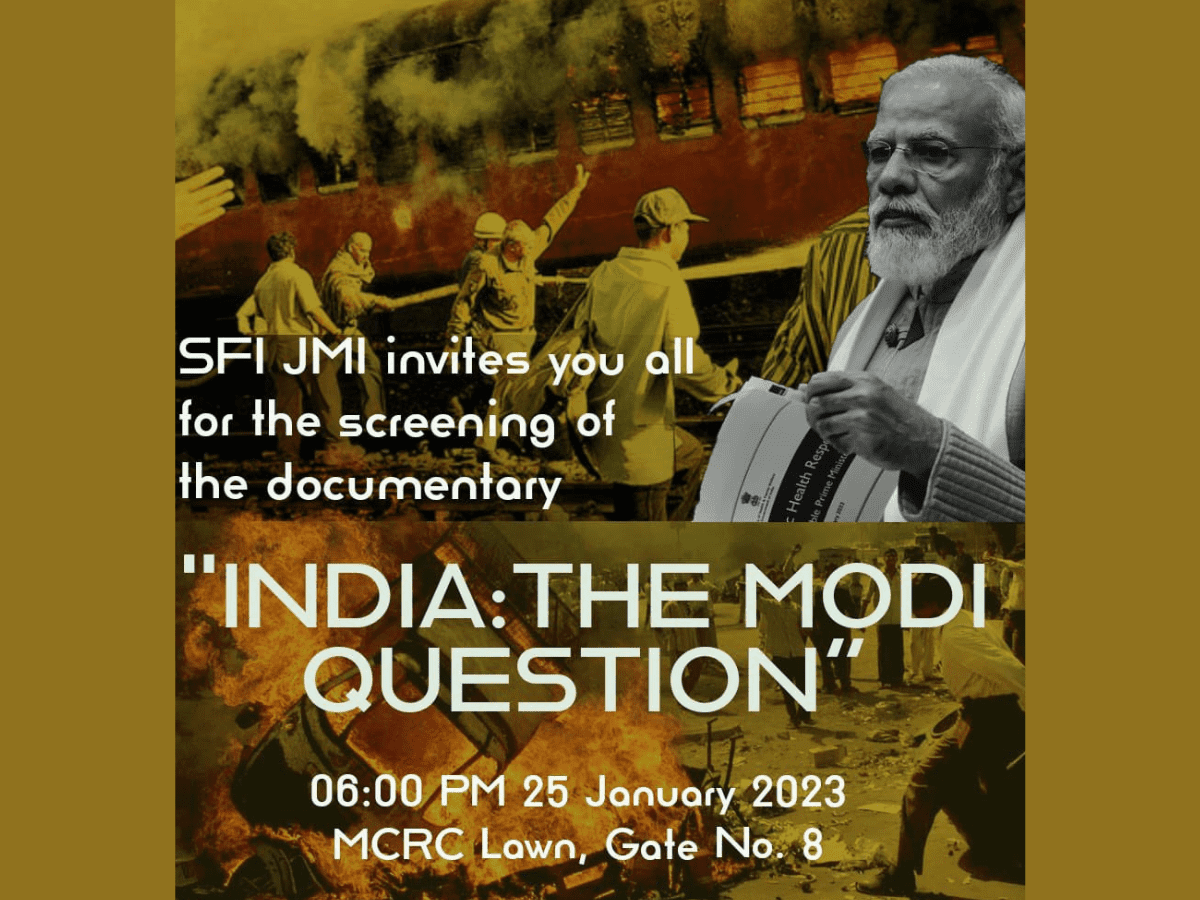
BBC on Wednesday released the second episode of the two-part documentary – ‘India: The Modi Question‘ – which directly blames Prime Minister Narendra Modi’s role in the 2002 Gujarat riots when he helmed the state as its chief minister.
The first part was released on January 19 and was shared by many on all social media platforms which encouraged debates around the 2002 Gujarat riots and the role of then chief minister Narendra Modi during the riots that killed more than millions and displaced many, especially Muslims.
The documentary series reportedly reveals ‘never-seen-before’ or ‘restricted’ documents in detail. It looks at the escalating tension between the Muslim community and the Bharatiya Janata Party (BJP) as well as Hindu right-wing organisations – Vishwa Hindu Parishad (VHP) and the Rashtriya Swayamsevak Sangh (RSS).
The documentary holds Modi directly responsible for the riots and states that such large-scale mass murder or in other words, a pogrom, was not possible without steady help from the state.
Modi government was quick to respond calling the documentary propaganda material ‘designed to push a particular discredited narrative.’
The Ministry of External Affairs (MEA) spokesperson Arindam Bagchi said, “The documentary is a reflection on the agency that has made it. We think it is a propaganda piece designed to push a particular discredited narrative. The bias, lack of objectivity, and continuing colonial mindset are blatantly visible. Can’t dignify such a film.”
As the documentary created interest and buzz on the internet, the Central Government banned its airing in the country as well as directed all social media platforms to remove any posts and links pertaining to the documentary, creating a protest call from netizens and Opposition parties.
With the help of Rule 16 of the IT Rules, 2021 — formally known as the Information Technology (Intermediary Guidelines and Digital Media Ethics Code) Rules, 2021 — notified on February 25, 2021, describes the government’s power with regard to “Blocking of information in case of emergency”.
The Ministry of Information and Broadcasting used emergency powers stating the documentary is based on a ‘colonial mindset’.
Following the ban, several student unions and political parties across India screened or tried to screen the documentary leading to tensions or conflict. Here are a few cities and states where the documentary was screened.
Hyderabad
In Hyderabad, the BBC documentary was screened at the University of Hyderabad (UoH) campus by a student group called the Fraternity Movement. Around 200 students turned up.
However, members of the ABVP complained to the university registrar who then released a statement saying no prior permission was taken by the students to screen the film.
Kerala
The documentary was screened in various places, including colleges, in Kerala on Tuesday with the BJP youth wing going up in arms in protest against the screenings.
In Thiruvananthapuram, the Youth Congress organised a screening at Manaveeyam Veedhi, a cultural space on Tuesday. The Democratic Youth Federation of India (DYFI) held one at Poojappura Maidan.
Not just Thiruvananthapuram, Kerala’s financial capital Kochi saw many screenings. The Students’ Federation of India (SFI) conducted screenings for students of the Cochin University of Science and Technology, Kalady Sree Sankaracharya University of Sanskrit, Maharaja’s College Ernakulam, and Government Law College.
The Communist Party of India (Marxist) state secretary V Govindan came out in support of the screening saying, “Banning the documentary is an undemocratic stand. Ideals should not be banned in a democratic society.”
Delhi
In New Delhi, the Jawaharlal Nehru University (JNU) saw the screening turned into a protest on Tuesday when student unions ignored the administration’s statement to cancel the screening which was supposed to take place on the same night at 9 pm.
The administration went ahead and snapped current and internet supply thus halting the screening. However, determined students started watching it on their laptops and phones. Protests between the college authorities and students broke out and incidents of stone pelting were also reported.
On Wednesday, a day after the ruckus in JNU, students at Delhi’s Jamia Milia Islamia university announced it would screen the banned BBC documentary at 6 pm.
While there are reports that several SFI students have been detained, the university has categorically said that no permission was given for the screening.
“The University reiterates that no meeting of students or screening of any film will be allowed in the campus without permission. University is taking all measures to prevent people/orgs having vested interest to destroy peaceful academic atmosphere here”, the university said in a circular.
By the time of publishing this report, Delhi Police has detained over 70 students who were gathered at Jamia Millia Islamia to protest against the detention of four activists over the proposed screening of a BBC documentary on Prime Minister Narendra Modi, the Students’ Federation of India said.
Member of Parliament A A Rahim from CPM party has strongly condemned the detention which includes female students also. In a tweet, he described the ban as a cowardly act by the Modi government. He demanded the immediate release of the students.
Kolkata
SFI of Presidency University in Kolkata has asked for permission from the university’s administration to show the banned BBC documentary on January 27 at 4 pm.
The student union sent an email to the university administration seeking permission to book the badminton court on the campus where the screening will take place. The university is yet to respond.



